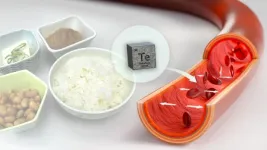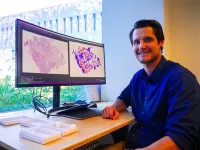(Press-News.org) The likelihood of developing high blood pressure (hypertension) increases with higher levels of tellurium, a contaminant transferred from mining and manufacturing activities to foods. Improved monitoring of tellurium levels in specific foods could help decrease high blood pressure in the general population. The results of a study examining the relationship between tellurium exposure and hypertension were published in the journal Environment International.
The study was led by Nagoya University in Japan. According to Takumi Kagawa, one of the researchers involved in the study, the findings are significant as they indicate that tellurium exposure may contribute to elevated blood pressure, a significant public health concern. “The results indicate diet was the most significant contributor to increased urinary tellurium levels, compared to other lifestyle factors, such as smoking and working status, and physiological factors, such as age and sex. Dietary intake, an important aspect of our lifestyle, plays a significant role in increased urinary tellurium concentrations.”
In Japan, cereals and legumes, represented by rice and natto (fermented soybeans), are popular dietary choices. These foods are packed with essential nutrients, such as high-quality carbohydrates, vitamins, and minerals, that support a person’s health.
However, tellurium, a rare metalloid, can also be present in these foods. Mining and manufacturing activities release dust, ash, and slag, which are responsible for the presence of tellurium in the soil. In certain cases, it can be transferred from the soil to crop plants, such as cereals, carrots, and garlic. Consequently, people are exposed to tellurium through food.
The study conducted by Professor Masashi Kato, Takumi Kagawa, and their colleagues involved 2,592 Japanese adults. It revealed that higher levels of tellurium in urine were associated with higher blood pressure and a greater occurrence of hypertension. The results were the same in both mice and humans.
“We administered tellurium to mice in amounts equivalent to what humans might encounter daily and observed an increase in blood pressure,” Tomoko Misawa, the lead author of the study, explained. “When we stopped the exposure, both the blood pressure and the tellurium levels in their urine decreased. These results provide a direct link between tellurium exposure and increased blood pressure, confirming findings in humans.”
Professor Kato and his team also studied foods that raise the levels of tellurium in urine. They discovered that the consumption of cereals and legumes caused high levels of tellurium, but further testing did not establish a direct link to high blood pressure rates.
“We found that despite raising tellurium levels in the urine, cereal/legume intake did not directly increase the risk of hypertension,” said Takumi Kagawa. “Cereals/legumes may contain many diverse nutrients that can mitigate the risk of hypertension despite high levels of tellurium. However, considering that increased tellurium exposure is a latent risk factor for hypertension and foods contribute to this association, careful and continuous monitoring of tellurium levels in individual foods may be crucial.”
“The urinary level of tellurium in this study was comparable with the levels in general populations in other countries,” Professor Kato said, “Our results indicate an increased potential risk of hypertension by tellurium exposure may be applicable to general populations all around the world.”
END
High blood pressure associated with environmental contamination by tellurium
2024-08-01
ELSE PRESS RELEASES FROM THIS DATE:
Pursuing the middle path to scientific discovery
2024-08-01
In electronic technologies, key material properties change in response to stimuli like voltage or current. Scientists aim to understand these changes in terms of the material’s structure at the nanoscale (a few atoms) and microscale (the thickness of a piece of paper). Often neglected is the realm between, the mesoscale — spanning 10 billionths to 1 millionth of a meter.
Scientists at the U.S. Department of Energy’s (DOE) Argonne National Laboratory, in collaboration with Rice University and DOE’s Lawrence ...
Salk awarded $3.6 million by the California Institute for Regenerative Medicine to advance research on brain aging
2024-08-01
LA JOLLA (July 31, 2024)—The Salk Institute was awarded $3.6 million by the California Institute for Regenerative Medicine (CIRM), one of the world’s largest institutions dedicated to regenerative medicine. Salk Professor Rusty Gage will lead the new CIRM-funded Shared Resources Laboratory focused on stem cell-based models of aging and neurodegeneration.
The award is part of CIRM’s latest round of funding to address challenges in the regenerative medicine field. The state agency dedicated $27 million to help establish six new Shared Resources ...
Generation X and millennials in US have higher risk of developing 17 cancers compared to older generations, new study suggests
2024-08-01
A new large study led by researchers at the American Cancer Society (ACS) suggests incidence rates continued to rise in successively younger generations in 17 of the 34 cancer types, including breast, pancreatic, and gastric cancers. Mortality trends also increased in conjunction with the incidence of liver (female only), uterine corpus, gallbladder, testicular, and colorectal cancers. The report will be published today in the journal The Lancet Public Health.
“These findings add to growing evidence of increased cancer risk in post-Baby Boomer ...
Around 160,000 joint replacement surgeries lost by COVID-19 pandemic, study finds
2024-08-01
Nearly nine months of joint replacement surgery has been lost - around 160,000 fewer operations – since the start of the COVID-19 pandemic, a new study led by the University of Bristol has found. The research suggests returning to pre-pandemic levels will not tackle the backlog, and even with rapid expansion, it will take many years, if not decades, to fix this joint replacement crisis.
The study, published in The Bone & Joint Journal today [1 August], looked in detail at the effect ...
Public health measures that reduce dementia risk could save up to £4bn
2024-07-31
Public health interventions that tackle dementia risk factors could yield as much as £4bn in savings in England by reducing dementia rates and helping people to live longer and healthier, finds a new study led by UCL researchers.
The study, published in The Lancet Healthy Longevity, shows that interventions – such as reformulating food products to reduce sugar and salt intake, introducing low emission zones to improve air quality in cities, and minimum alcohol unit pricing to reduce drinking – could have extensive benefits beyond just the health outcomes they are directly targeting.
Lead author Dr Naaheed Mukadam (UCL Psychiatry) ...
The Lancet: Nearly half of dementia cases could be prevented or delayed by tackling 14 risk factors starting in childhood, including two new risks—high cholesterol and vision loss
2024-07-31
Vision loss and high cholesterol add to 12 previously identified modifiable risk factors for dementia, concludes a new report from the 2024 Lancet Commission.
The potential to prevent and better manage dementia is high if action to tackle these risk factors begins in childhood and continues throughout life, even in individuals with high genetic risk for dementia.
New report outlines 13 recommendations for individuals and governments to help reduce risk, including preventing and treating hearing loss, vision loss, and depression; being cognitively active ...
Precision oncology via artificial intelligence on cancer biopsies
2024-07-31
A new generation of artificial intelligence (AI) tools designed to allow rapid, low-cost detection of clinically actionable genomic alterations directly from tumor biopsy slides has been developed by a team led by engineers and medical researchers at University of California San Diego.
A paper describing the new AI protocol for examining routine biopsies, called DeepHRD, was recently published in the Journal of Clinical Oncology.
Senior author Ludmil Alexandrov, Ph.D., professor of bioengineering and professor of cellular and molecular medicine at UC San Diego, says the new method is designed to save weeks and thousands of dollars from clinical oncology treatment workflows ...
What you don't know about endometrial cancer could kill you
2024-07-31
CLEVELAND, Ohio (July 31, 2024)—Despite the fact that endometrial cancer is the most common cancer of the female reproductive organs, a significant percentage of women do not know that postmenopausal bleeding is a key warning sign of the disease. Worse, even fewer women report having received any type of counseling on the subject from their healthcare professionals. That’s according to a new study published online today in Menopause, the journal of The Menopause Society.
It is estimated that 67,880 new cases of ...
Does it matter that the ovaries are the most rapidly aging organs in the female body?
2024-07-31
CLEVELAND, Ohio (August 1, 2024)—Because of the aging of the ovaries, a woman’s fertility gradually declines, and she eventually enters menopause. The onset of menopause puts women at a significantly higher risk of various diseases such as cardiovascular disease and osteoporosis. A new study suggests that a shorter reproductive lifespan is linked with a higher risk of multimorbidity. Results of the survey are published online today in Menopause, the journal of The Menopause Society.
The effect of reproductive-related factors on women’s health has become a focus of interest and study in recent years. Previous studies have identified the ...
Serotonin uptake regulates ependymoma tumor growth
2024-07-31
(MEMPHIS, Tenn. – July 31, 2024) Do neurons play a role in brain tumor growth and development? Scientists at St. Jude Children’s Research Hospital and Baylor College of Medicine have evidence showing that, for childhood ependymomas, they do. There are no targeted therapies available to treat ependymoma due in large part to a lack of understanding of the tumor microenvironment. By leveraging a recently developed murine model, scientists explored the interaction between ependymoma cells and surrounding neurons. They found that hyperactivation of a specific subset ...





